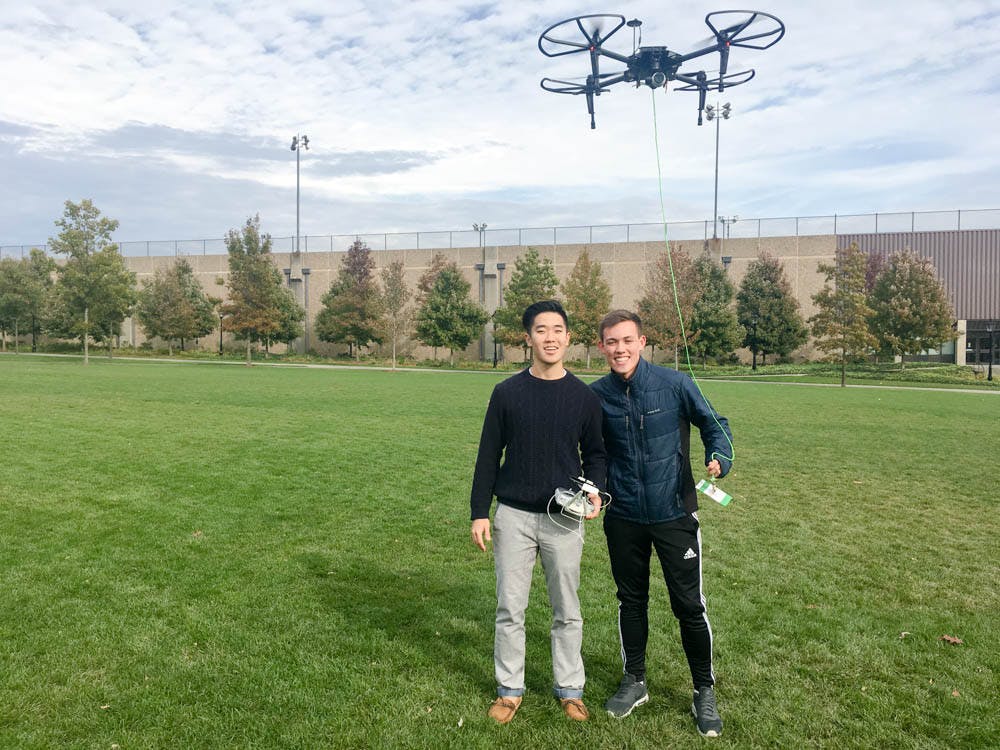A2Z Drone Delivery, created by Jacob Dyer ’19 and Aaron Zhang ’17, launched this semester.
The project began when Zhang interned in China with Da-Jiang Innovations, the world’s largest drone manufacturer, over the summer. After his internship, Zhang wondered how he could continue working with drones at Brown.
The solution was a “drone diplomacy” between DJI and Brown, Zhang said. The company was very interested in bringing drones to Brown and loaned Zhang developer models to begin creating a business, he added.
For their deliveries, Zhang and Dyer use the Matrice 100 industrial drone model, which “is the most stable drone that anybody can really get, unless you’re in the military,” Zhang said. The business currently uses the drone to deliver tickets to events hosted by Small Victories, an entertainment company.
Though it may still seem unfamiliar for many, drone delivery is “a really cool concept” that people enjoy, Dyer said. The company focuses mainly on the “experience” of having tickets delivered by drone rather than the delivery method’s practical value, Zhang said.
Due to Federal Flight Administration regulations, A2Z Drone Delivery has to comply with several safety restrictions. For example, the drone cannot fly out of the controller’s sight, over roads or people or at night. These rules can be waived based on the credibility, safety and purpose of the company, Zhang said.
The business also has to consider drone rules at Brown, Zhang said. Jerry Daniels, associate professor emeritus of engineering and the faculty advisor for the project, spoke with the University last month regarding drone rules and is still waiting to hear back. “They’re still in development, but we’re working closely with them,” Zhang said.
Though drones are a new concept, the rules surrounding them should be more developed at Brown, Daniels said.
The company’s next goal is to deliver food from Josiah’s to students, which will require more research that is currently underway, Zhang said. Zhang and Dyer hope to place the base of the drone delivery system on the top of the Metcalf Chemistry and Research Laboratory and for it to ultimately be a completely autonomous service, Zhang added.
In order to develop this system, the company is working with Nikolay Nikolov, a student at Imperial College in London.
Nikolov is focusing on software development to make the drone autonomous and is designing the tethering system for the drone, he said. The tethering system is critical for the drone to be able to deliver heavier objects, Zhang said.
Zhang is currently experimenting with new drone technology in hopes of making the machines safer. After Zhang cut his finger while experimenting with a drone, Daniels encouraged him to begin thinking about developing a safer model, Daniels said.
Thinking about safety “laid the foundation” for Zhang to develop a new design for the drone. “Before that, I thought, ‘What can it do? It’s just a toy,’” Zhang said.
The new design is a completely enclosed model that can hold an internal combustion engine and is supposedly safer than other drones on the market. It has the potential to be gas-powered, leading to increased battery life and heavier load capabilities.
Zhang hopes his new drone design emphasizing safety and gas power could “flip the drone business,” he said.
“People have defaulted to this traditional design, and we want to move that forward,” Zhang said. “If we patent it, and we actually license it, we would really change the business.”





